Why Public Education Brings Out My Socialism
And some reflections on the Portland Teacher's Strike
I’ve written before about how I’m coming around to anarchism as a viable alternative to our current every-person-for-themselves form of capitalism. What has kept me from throwing myself into the anarchy camp completely, though, is my commitment to public education. In fact, many of the discussions that planted the seeds of anarchy-as-solution in my mind were with my friend Davis who, as I mentioned in this story, asked me if our kids wouldn’t be better off being educated in tighter-knit communities, that they weren’t learning some top-down curriculum instituted by the government.
I see where Davis is coming from. Especially so when we’re seeing book bans and homophobic policies being handed down from state governments seeking to control what children can and can’t learn and what teachers can and can’t say. There’s a danger depending on who is in power. Yet I also wonder that if we become so insular and community-centric in our learning, will there inevitably be kids who are just left out altogether?
It’s in these thoughts that I still hold on tight to my ideals of public education as an essential public good. It was public education where my values around democratic socialism formed when I earned my master’s in international education policy and went into a two-year deep dive into progressive policies for public education. It’s why, right now as our teachers in Portland—Oregon’s largest school district—are striking (in order to advocate not only for better pay and adequate prep time, but for more school investments and steps to creating a more diverse education workforce), I’ve been marching in solidarity with them.
Listen, strikes suck. No one wants a strike, least of all teachers. But as we’re seeing throughout the labor movements across the country with strikes from the WGA, SAG-AFTRA, auto workers, health workers, and teachers alike, they are necessary in a capitalist society for workers to fight for what they deserve. It’s especially striking when teachers, who are working for a public entity, must use the means of capitalism to get what they need and deserve; what our kids need and deserve.
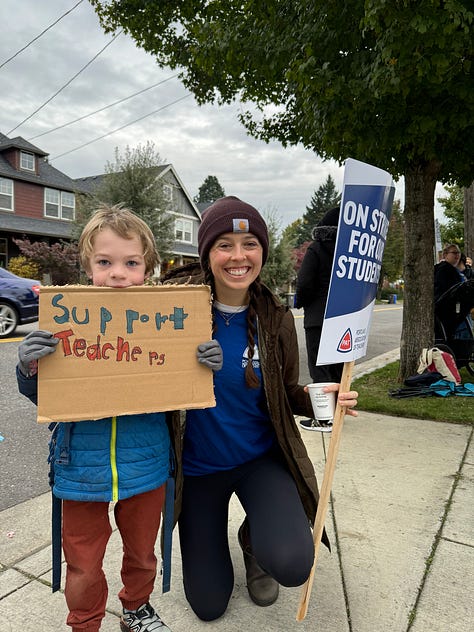

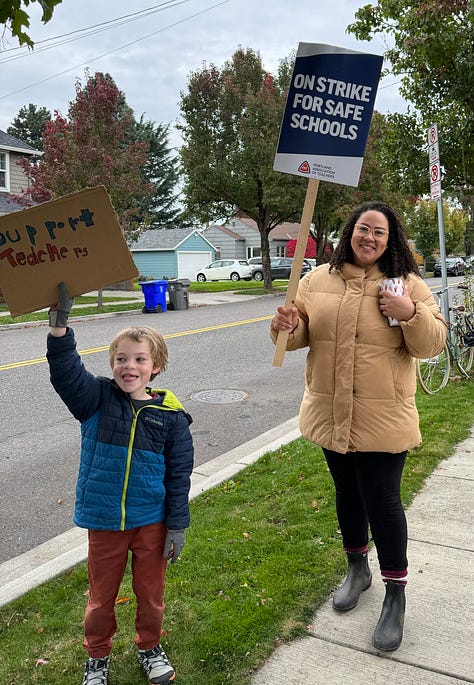

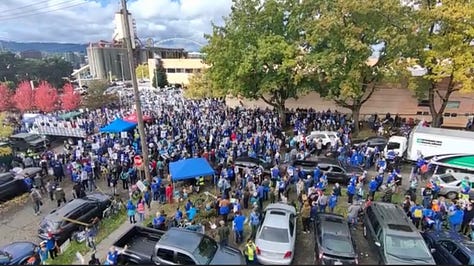
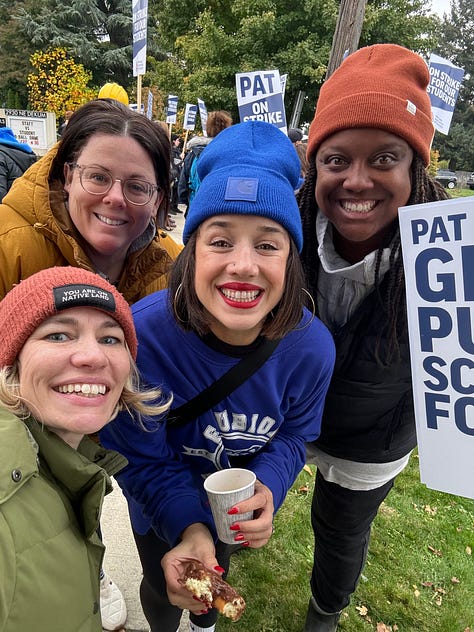
The backdrop to all of this where, in the United States, there’s a concerted effort on the right to privatize education which has been cast seemingly benignly as “school choice.” “Choice” comes in many forms, but this has been done through lotteries of school vouchers for any kid who wouldn’t otherwise be able to afford private school to use that to go anywhere they want for school in their city. Another part of it is the expansion of charter school options which, while still under the public school umbrella, they’re still not beholden to the same standards as all the other public schools nearby. And because public schools get funding based on enrollment, this also means that the money that goes with the student who goes elsewhere outside the public school system then leaves the neighborhood school. The more families who choose to go elsewhere means a further erosion of an important public resource. Whether they choose a private school or a “higher-ranked” school (which studies show tend to have a higher concentration of White students), what this “school choice” situation does is strips the public education system of more funding on one hand and contributes to racial segregation.
While School Choice seems somewhat harmless on the surface (who doesn’t love “choice”?!), it has some more insidious roots in American history. After the Brown v. Board of Education decision that outlawed racial segregation in schools, School Choice and the voucher system was a way for White families to opt out of going to school with Black students. Today, it’s cast more as a way to give lower-income students, often Black and brown students, access to greater educational opportunity. Never mind that their peers are still going to the schools that these students are given a ticket out of. It’s also used by those who do have the resources to essentially “game” the system, whether they know it or not. While everything we do is a personal choice, the consequences aren’t just on our own kids, but on society and all kids as a whole.
And therein lies the reason I’m a socialist when it comes to education. It’s a recognition of our interconnectedness, it’s an understanding that together we should be advocating for our systems to work for all people and not just our own family unit, and it’s an opportunity to find our power as a united force. While I know that this strike is impacting a lot of people negatively—there are a lot of families who can’t afford childcare while our kids are out of school for days—it is one of those necessary steps to take in order to compel us all to buy in that our future is wrapped up together.
When we have a society with so many people in it, with such diversity, and with such a history of racism and segregation, I still have a hard time envisioning how smaller community-focused schools could be the answer. In one way, I do think that it could be better for Black and brown students to not have to be subject to the systemic and institutional racism of the education system where Black students are punished much more than their White peers for minor infractions. Yet, for our diverse and very large society, I don’t think the answer is to strip the education system of its resources. Rather, if we invested more in our schools, if we invested in creating a pipeline of teachers that match the diversity of our schools, if we invested in trained trauma-informed personnel who could meet students where they are at and understand their own biases before punishing students, if we could create a safe and welcoming school environment for all students, then we’d be in a better place.
That’s what Portland Public School teachers are fighting for. They work with these students every single day. The answer is not to invest millions of dollars in a curriculum that doesn’t meet all student needs. The answer is to support the people and the buildings that serve our kids every single day. That is what our tax dollars should be supporting and that’s also why I remain invested in the public school system.
I realize that when society and capitalism crumble, socialism may not be the answer. Community-centric education is probably the best option in those circumstances. But I wonder if supporting our public schools, leaning into those socialist ideals of the public good, is a way to create a system that won’t crumble, that won’t succumb to capitalist interests. I also believe that if we all bound together to see that all our futures are interconnected and we can fight for the good of everyone and not just for our own, that might lead to a better, more interconnected community whenever things do fall. Perhaps it’s one of the answers to stave off the worst as well as a way to make a better society in the end.





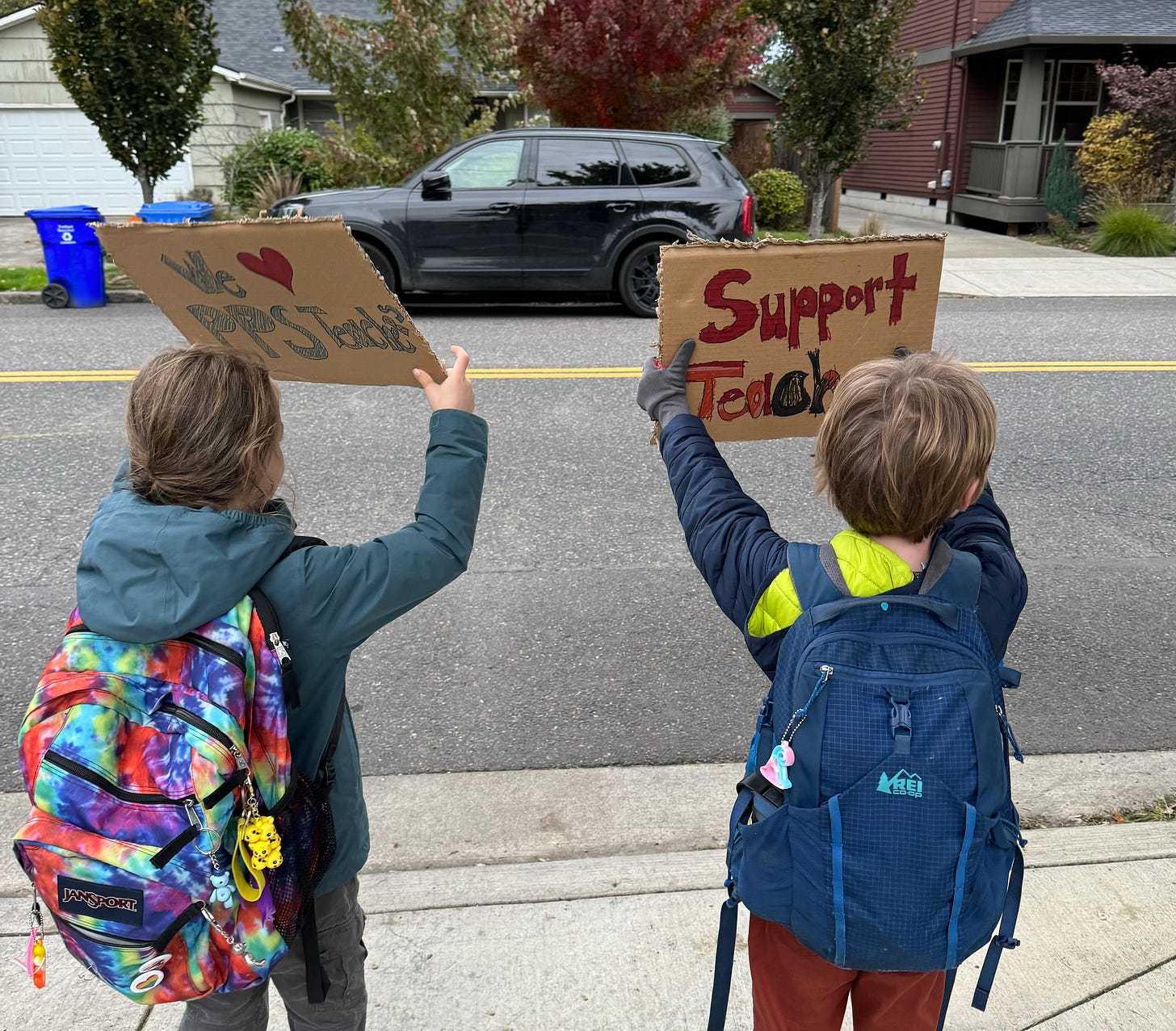
Thanks for giving more context about the strike. There is no job more important than teacher and I hope they are properly compensated very soon.
Public education has such an opportunity to be an equalizer. I want to believe in our public schools. But then, the quality of our local public schools makes us extremely reluctant to send our children there, when they are old enough.
Children, starting with full-day kindergarten, do not get a real recess. Only 14% of children are reading at grade level, and a shocking 7% are doing math at grade level.
Violence is prevalent, with children bringing in weapons regularly, and teachers spending most of their day disciplining students instead of teaching.
I shudder to imagine sending a 5-year old into this hostile environment for 8 hours a day. "School choice" is taking resources away from our public schools, so I loathe to buy into that system. Nor do I want to send my child to a mostly white, upper-class private school. Homeschooling has many of the same downsides. We would like to move, to flee for better schools, but that is also problematic, as well as costly.
My son is only 2, so we have some time before this decision needs to be made. Despite this, the dilemma consumes me constantly already. I know that the more parents can be involved in their local schools, the better the outcomes are for all students.
I want to give that investment and support. But at what cost? My child's mental health and education? This burden falls on parents while officials squander our money and fail our children. I think it is important to note that we are in an extremely liberal state, where policy almost always aligns with my personal progressive belief system, but something is not right. This is not right.
PS: If you haven't listened to it already, I recommend the podcast "Sold a Story," which is about how U.S. public schools are not teaching children to read.